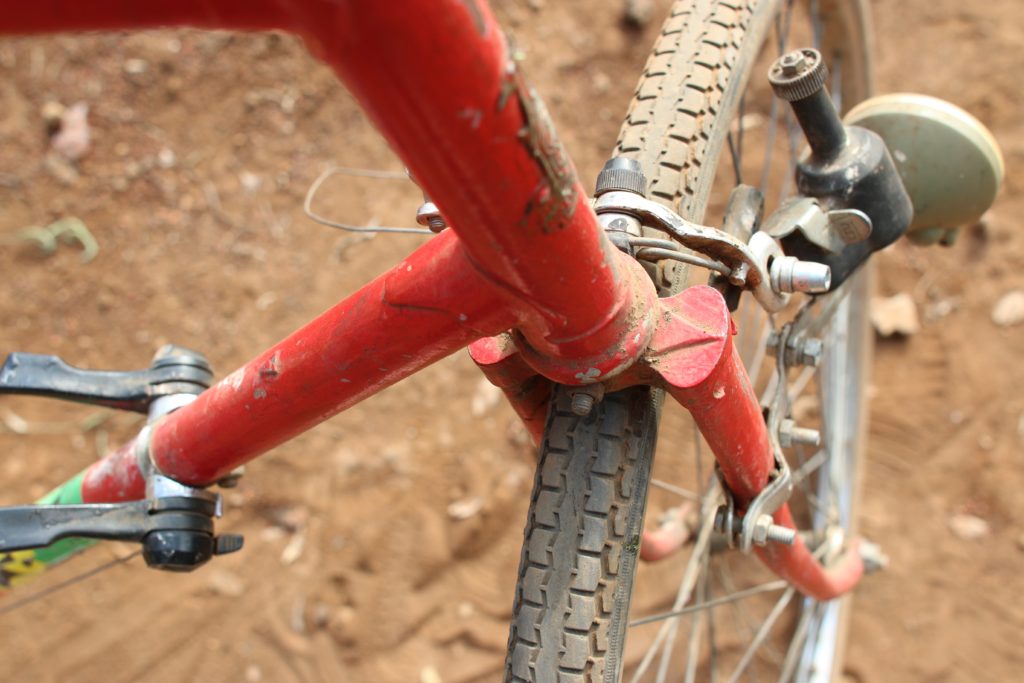The joy of bike shops
I was in the bike shop the other day… not inside it, obviously, due to the lockdown, but close enough to wistfully look at the tyres on hooks and think about all the bike shops I’ve known.
Big up the bike shops, a beacon of light in these dark times, especially Rayment Cycles in Brighton. And here's another extract from the Bicycle Clip Diaries which is obviously still not available in all good book stores, but from my website, details below.
"I love bike shops. They are happy places, full of optimism and promise. Even when I don’t technically need anything, if I’m in a new town, or a new country, I’ll go in and have a poke about. When I worked in an office near the City, I loitered in bike shops during my lunch hour to the extent that I thought I might get barred, expecting my grainy image to appear on a photocopied ‘do not serve’ list of the type you get in small town pubs. In the same way that Woody Allen loves his jazz clubs as much for the people as the music, I love the atmosphere of a bike shop as much as for the items on sale.
Like everything else, bike shops have changed over time. They used to be small places called something solid like Cartwright & Sons, where you’d open a creaking door and a comforting bell would sound. The door would close with a satisfying and solid ‘kerthunk’. After a suitable pause an elderly gentleman would pop up from behind a counter piled high with dusty inner tube boxes, perhaps banging his head on a row of orange-walled, sensible tyres hanging from a ceiling.
He would ask you what you want, and if you mumbled ‘Just looking, thanks’ he would probably come at you with a broom. Nobody tried. Retail was not thought of as a leisure activity. The exchange of cash for goods was essentially utilitarian.
The idea that bike shops would one day become spacious, well-lit places with pop music, staffed by young people with name badges? It was inconceivable not so long ago.
The Lycradollar hadn’t taken over: even serious cyclists still wore woollen jerseys which would stay wet for several weeks after a ride, with things like West Bromwich Corinthians Cycling Club written on them. Such emporia would sell bicycles from a suspiciously incomplete range of manufacturers, which would have a non-removable Cartwright & Sons sticker somewhere on the frame. You could still easily pick up a pair of bicycle clips, no questions asked.
It made buying decisions easier, obviously, because you wouldn’t spend hours looking at the reviews of possible purchase options, because there weren’t any. You trusted in your bike shop guy, and maybe the catalogue. So long as you didn’t want Skyway Mag wheels, yellow mushroom grips or any of the new Japanese or American BMX accessories that had started to flood the streets in the early 80s, you were fine.
Bicycle shops in Britain today are often upbeat places where you are encouraged to spend time. Spaces which unashamedly appeal to the emotions, and there is nothing like the emotion of someone considering their next bicycle.
I love the drama in the earnest exchanges. The hypnotic sales talk is confusing and yet pleasing, a combination of poetry, engineering and aspiration. The retailer-shaman uses terms like ‘lateral stiffness’ and ‘responsiveness’ to overweight men with such seriousness that they seem not to question what these words might actually mean, or what difference they will make to their overall life chances.
You can tell that bringing your actual working bike into such a space is not quite welcome; like a wheelchair user in a trendy nightclub, they can’t throw you out, but you know they don’t really want you there. There’s something about a bike which has actual dirt, scratches and mudguards amongst all the pristine new bicycles they want you to buy that shatters the showroom illusion they work so hard to preserve.
Bike shops in rich countries have videos on loop which show young athletes going fast in the blue-skied Alps. It’s never a red-faced, middle-aged man in an angry exchange with a taxi driver on the Holloway Road in November drizzle. They don’t want real bikes, with a stolen front wheel or a flat tyre. They are selling the dream of the new you that you can become. If you spend just that little bit extra on the Dura-Ace or the Nimbus 2000 crankset.
It’s a bashful dance, the shop assistant in suppressed awe of the elixir of customer’s wealth. The customer is equally aware of the shop assistant’s sharp-edged calves. It’s no accident that they make you wear shorts if you work in a bike shop.
The young, skinny salespeople clearly spend a lot of time on bikes they themselves presumably couldn’t afford without a staff discount, and several years of extra shifts.
The customers have read the reviews, and they want access to advanced innovative engineering, which has been designed for elite level athletes. To feel that they deserve to be in this club. So they spend thousands of pounds on bicycles to achieve a weight loss which could have been more easily achieved through eating one less pie.
‘Some of our less refined customers, Sir, well they are happy with the mid-range bike, but I can see you are a real cyclist, the kind who would appreciate stepping up to full carbon. I can tell you’ll respond to its responsiveness, its lateral stiffness. But without upgrading to electronic gear shifting, it would really be a false economy.’
I like them all, but when you’ve found your Goldilocks, just right, bike shop, it’s wonderful thing. The place you can trust for repairs, and which is run by enthusiasts who tolerate your questions. Maybe a place where there is cake and coffee and they let you into the workshop and show you how to true wheels, like Roll For The Soul in Bristol. So I had high expectations of my first African bike shop..."
Spoiler alert: African bike shops are a disappointment; to find out why, read on.
https://nickraistrick.com/ - £12.99, including postage
or on Kindle
In Brighton, you can also pick up a copy from Tilt (café in Fiveways).
(if you are unwaged, DM and I'll try and send you a copy as a gesture of goodwill. Ditto key workers and bike shop staff)

